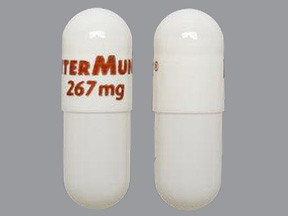PIRFENIDONE - ORAL
PHONETIC PRONUNCIATION: (pir-FEN-i-done)
COMMON BRAND NAME(S): Esbriet
GENERIC NAME(S): pirfenidone
Uses
USES: Pirfenidone is used to treat a certain lung disease called idiopathic pulmonary fibrosis (IPF). This disease causes the lungs to get scarred and become stiff, making it hard to breathe. Pirfenidone may help slow down the worsening of your IPF.
How to use PIRFENIDONE - ORAL
HOW TO USE: Read the Patient Information Leaflet if available from your pharmacist before you start taking pirfenidone and each time you get a refill. If you have any questions, ask your doctor or pharmacist. Take this medication by mouth with food as directed by your doctor, usually 3 times a day. Taking pirfenidone with food may help decrease dizziness and nausea. To reduce your risk of side effects, your doctor may direct you to start this medication at a low dose and gradually increase your dose. Follow your doctor's instructions carefully. The dosage is based on your medical condition, response to treatment, and other medications you may be taking. Be sure to tell your doctor and pharmacist about all the products you use (including prescription drugs, nonprescription drugs, and herbal products). Take this medication regularly to get the most benefit from it. To help you remember, take it at the same times each day. Tell your doctor if your condition worsens.
Side Effects
Precautions
Interactions
Overdose
Images

- color
- white
- shape
- oblong
- imprint
- InterMune and logo 267mg
Reviews
Faq for PIRFENIDONE - ORAL
Pirfenidone is an oral medication used to treat idiopathic pulmonary fibrosis (IPF), a progressive lung disease that causes scarring and thickening of the lung tissues.
The exact mechanism of action of Pirfenidone is not fully understood, but it is believed to reduce the production of certain growth factors and cytokines involved in the fibrotic process, thereby slowing down the progression of IPF.
The recommended dosage of Pirfenidone is typically 801 mg (3 capsules) taken orally three times a day, with food.
Yes, common side effects of Pirfenidone include nausea, vomiting, decreased appetite, diarrhea, fatigue, rash, and photosensitivity (increased sensitivity to sunlight).
Pirfenidone is not recommended in patients with severe liver impairment or end-stage renal disease. It should be used with caution in patients with moderate liver or kidney impairment.
The effects of Pirfenidone may not be immediately noticeable. It may take several months of treatment before significant improvements in lung function or symptoms are observed. Regular follow-ups with a healthcare professional are necessary to monitor the progress.
Pirfenidone may interact with certain medications, so it is important to inform your healthcare provider about all the medications you are currently taking, including over-the-counter drugs and herbal supplements, before starting Pirfenidone.
Pirfenidone should not be used during pregnancy unless clearly needed as it may harm the developing fetus. It is also not known whether Pirfenidone passes into breast milk, so it is advisable to avoid breastfeeding while on this medication.
Pirfenidone is not a cure for idiopathic pulmonary fibrosis. It is used to slow down the progression of the disease and improve symptoms, but it cannot reverse the lung damage already present.
Disclaimer
IMPORTANT: HOW TO USE THIS INFORMATION: This is a summary and does NOT have all possible information about this product. This information does not assure that this product is safe, effective, or appropriate for you. This information is not individual medical advice and does not substitute for the advice of your health care professional. Always ask your health care professional for complete information about this product and your specific health needs.

No Reviews Yet